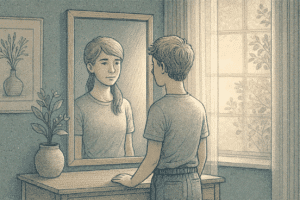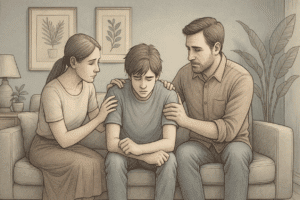5 Early Signs of Mental Health Issues in Teens
Life is tough when you’re a teen. Teens crave independence while needing the comfort of having supporting and loving people around them. They also have massive physical and psychological changes—a combo that makes them uniquely vulnerable to mental health issues.
Around 1 in every 4 US teens has a diagnosed mental health condition–concerning, to say the least.1 What’s more, teen mental illness often goes unnoticed.2 Many teens are typically hesitant to ask for help, instead attempting to figure it out on their own. Unfortunately, this means many teens suffer in silence.
But it’s not all doom and gloom. As 50% of people who struggle with a mental health condition show symptoms by age 14, early recognition and support during the teenage years is possible.3 Spotting the signs sooner rather than later helps nip mental ill-health in the bud, preventing your teen from struggling as an adult.
As a parent, there’s a lot you can do. By encouraging open conversations and heeding the warning signs, you can help your teen take control of their mental wellbeing. In this article, we’ll explore five key signs of mental health issues in teens and how you can best support them.
How Does Mental Health Affect Teens?
Mental health plays a critical role in teens’ overall wellbeing. Adolescence is a time of fast (and often unpredictable) changes—raging hormones, academic pressure, and social challenges—all of which can heighten this age group’s vulnerability to mental health issues.
Unfortunately, mental health doesn’t only have an impact on how a teen feels about themselves. Mental ill-health in teens can seep into every aspect of their lives, increasing their risk of:
- Lower academic achievement
- Poorer self-esteem
- Substance and alcohol abuse
- Physical symptoms, including fatigue, headache, changes in appetite or sleep patterns4
What’s more, if left untreated, mental health issues in teens can have lasting effects, right into adulthood. For example, they may struggle with further episodes of mental ill health, lower life satisfaction, and a poorer overall quality of life.5
However, it’s reassuring to know that a lot can be done to prevent this. By recognizing the signs and symptoms early, you can support your teen when they need it most. But before we get onto the strategies, there’s one all-important question you’re likely asking: What may be causing your teen’s mental illness?
Causes of Mental Illness in Teens
First things first, it’s important to know that there will be no one single cause of your teen’s mental ill-health. Mental illness often stems from a variety of factors that mix together to make life feel overwhelming or anxiety-provoking.
A combination of biological, environmental, and social factors can underlie mental disorders in teens. These may include:
- Genetic Predisposition: A family history of mental health conditions can increase a teen’s likelihood of experiencing similar issues, particularly for conditions like schizophrenia or bipolar disorder.
- Family Dynamics: Unstable home environments or parental conflict can contribute to emotional distress in teens—sometimes increasing the risk of mental health conditions.
- Peer Pressure: Social expectations and pressure to fit in can lead to anxiety, low self-esteem, and risky behaviors.
- Trauma: Experiences of abuse, violence, or significant loss can increase the risk of conditions like PTSD or depression.
- Social Media: Excessive social media use can intensify feelings of inadequacy, comparison, and cyberbullying, negatively impacting self-esteem and mental health in teens.
- Academic Stress: High expectations to excel in school can trigger overwhelm, potentially leading to chronic stress, burnout, and feelings of inadequacy.
This is, by no means, an exhaustive list. We are learning about new factors affecting teen mental health all the time. However, this list is a great place to start when thinking about what’s underneath your teen’s mental health difficulties.
When risk factors overlap—for instance, when a teen with a genetic predisposition faces trauma and academic pressure—it increases a teen’s potential vulnerability to mental health difficulties. Knowing this means you can identify how “at-risk” your teen is, allowing you to take steps to support them, if necessary.
How Does Social Media Affect Mental Health in Teens?
Social media use is an ever-growing part of teens’ daily lives. In 2022, 95% of teens admitted to using YouTube and 67% using TikTok—followed closely by Instagram and Snapchat.6
According to a study involving U.S. teens aged 12-15, those who spent more than three hours a day on social media had twice the risk of experiencing depression and anxiety symptoms.7 This is concerning given teens spend an average of 3.5 hours on social media each day.8 What’s more, 46% of 13-17-year-olds said that social media made them feel worse about their body.9
However, it wouldn’t be right to name the drawbacks of social media without mentioning the benefits it can have for teens. Some teens say it’s fundamental to making healthy friendships, for example. The key here is using social media mindfully.
For parents, weighing up the pros and cons of your teen’s social media use—and putting boundaries in place to manage the time they spend on these potentially harmful apps—can be a great way to curb the impact on their mental health.
5 Early Signs of Mental Health Issues in Teens
To truly help your teen manage their mental health, you first need to recognize the signs of them struggling. Let’s explore 5 early signs of mental health issues in teens.
- Unexplained Changes in Sleep or Appetite
Sudden shifts, such as sleeping too much or too little, or significant changes in your teens’ eating patterns, can signal emotional distress or an underlying mental health difficulty.
- Low Mood or Loss of Interest in Things They Used to Enjoy
Being continuously sad or disinterested in hobbies, sports, or other activities they once loved—also known as anhedonia—can be a potential indicator of depression or other mental health struggles.
- Irritability, Restlessness, or Excessive Worry
Bouts of restlessness or irritable mood could hint at anxiety, stress, or emotional overwhelm in a teen. Taking a moment to look beyond your teens’ behavior, and considering what might be driving it, will help you decipher whether they require professional mental health support.
- Changes in Social Relationships or Withdrawing From Friendships
Friendships are important for all of us, but perhaps not quite so fundamental as in our teen years. When we’re teens, we transition from being dependent on our parents or caregivers for survival and instead look to our peers. “Fitting in” and getting along with people your own age is important for most teens, and if these pose a difficulty for them, it can affect their mental health.
If your teen is avoiding their friends or has lost interest in social activities, it could reflect mental health difficulties.
- Difficulty Concentrating
If your teen’s mind seems elsewhere, or they’re struggling to concentrate in school, it could be a sign of underlying emotional distress. Struggling to focus is a common symptom of various mental health conditions, including anxiety and depression.
How to Help a Teenager With Mental Health Issues
When your teen is struggling, it can be hard to know where to start—but as a parent, you can make a huge difference. Below are three tips to support your child through any mental health difficulties they might be facing.
- Practice Open Communication
When your child enters teen years, it’s often not an easy ride. They may shrug off your attempts to support them, or act like they don’t need you most of the time—that’s also normal! While this can feel rejecting, these behaviors show you that they’re going through a tough time.
One key way you can be there for them is by practicing open communication. This creates a safe space at home, where your teen will feel comfortable talking about their thoughts and feelings.
If they open up, listen empathetically, validate their emotions, and reassure them they’re not alone. Likening mental health to physical health can be a great way to reduce feelings of internal stigma and encourage them to keep opening up—like physical health, mental wellbeing is something we all have and must take care of.
- Encourage Balance & Healthy Habits
Keeping a balanced lifestyle can significantly improve a person’s mood and reduce symptoms of anxiety and depression.10 So, encouraging your teen to preserve a balanced routine is a great way to support their mental wellbeing. This could include a combination of:
- Nutritious food
- Sufficient sleep
- Regular exercise
- Specific times to socialize
- Seek Professional Support (If Necessary)
If you’ve read this far and noticed your child may be struggling with mental ill-health, don’t wait to seek confidential support.
At Mission Prep, we offer specialized support for mental health in teens which utilizes cutting-edge, evidence-based therapies. Our team aims to help teens who are struggling to build resilience and move forward with confidence. Our outpatient programs allow us to provide ongoing care without disrupting you or your child’s routine.
For more complex or severe difficulties, our residential centers and inpatient programs offer structured support in a calm, peaceful environment that’s conducive to healing.
Support Your Teen Today
Supporting your child through the teenage years can feel overwhelming, but understanding the warning signs is the first step to helping your child begin to feel better.
With the right support—whether it’s seeking professional help, encouraging healthy routines, or having regular open and honest conversations—you can help support your child to feel mentally healthy.
Get in contact with Mission Prep for more information about what you can do and the services we offer. We’re here to support you, no matter the circumstances.
References
- Merikangas, K. R., He, J. P., Burstein, M., Swanson, S. A., Avenevoli, S., Cui, L., Benjet, C., Georgiades, K., & Swendsen, J. (2010). Lifetime prevalence of mental disorders in U.S. adolescents: results from the National Comorbidity Survey Replication–Adolescent Supplement (NCS-A). Journal of the American Academy of Child and Adolescent Psychiatry, 49(10), 980–989. https://doi.org/10.1016/j.jaac.2010.05.017
- Jorm A. F. (2012). Mental health literacy: empowering the community to take action for better mental health. The American psychologist, 67(3), 231–243. https://doi.org/10.1037/a0025957
- Kessler, R. C., Berglund, P., Demler, O., Jin, R., Merikangas, K. R., & Walters, E. E. (2005). Lifetime prevalence and age-of-onset distributions of DSM-IV disorders in the National Comorbidity Survey Replication. Archives of General Psychiatry, 62(6), 593–602.
- Fergusson, D. M., & Woodward, L. J. (2002). Mental health, educational, and social role outcomes of adolescents with depression. Archives of general psychiatry, 59(3), 225–231. https://doi.org/10.1001/archpsyc.59.3.225
- Schlack, R., Peerenboom, N., Neuperdt, L., Junker, S., & Beyer, A. K. (2021). The effects of mental health problems in childhood and adolescence in young adults: Results of the KiGGS cohort. Journal of Health Monitoring, 6(4), 3.
- Vogels, E. A., Gelles-Watnick, R., & Massarat, N. (2022, August 10). Teens, social media and technology 2022. Pew Research Center. https://www.pewresearch.org/internet/2022/08/10/teens-social-media-and-technology-2022/
- U.S. Department of Health and Human Services. (n.d.). Social media and youth mental health. Office of the U.S. Surgeon General. Retrieved December 18, 2024, from https://www.hhs.gov/surgeongeneral/priorities/youth-mental-health/social-media/index.html
- Miech, R. A., Johnston, L. D., Bachman, J. G., O’Malley, P. M., Schulenberg, J. E., & Patrick, M. E. (2021). Monitoring the Future: A Continuing Study of American Youth (8th- and 10th-Grade Surveys). Inter-university Consortium for Political and Social Research. https://doi.org/10.3886/ICPSR38502.v1
- Digital Wellness Lab. (2022). Adolescent attitudes, effects, and experiences: Social media and well-being (Pulse Survey Report). Boston Children’s Hospital. https://digitalwellnesslab.org/wp-content/uploads/Pulse-Survey_Adolescent-Attitudes-Effects-and-Experiences.pdf
- Anxious Minds. (n.d.). Reduce anxiety and depression. Retrieved December 18, 2024, from https://www.anxiousminds.co.uk/reduce-anxiety-and-depression/


















